Trump impeachment trial: Question period ends as GOP swing votes emerge
The Senate trial could be over by the weekend if Republicans have the votes.
Senators returned Thursday for a second day of questions to House managers and President Donald Trump’s legal team in his impeachment trial as attempts by Democrats to rally votes for new witnesses appeared to have stalled.
Multiple Republicans tell ABC News they hope to move quickly to a vote to acquit the president as early as Saturday, ahead of his State of the Union address on Tuesday.
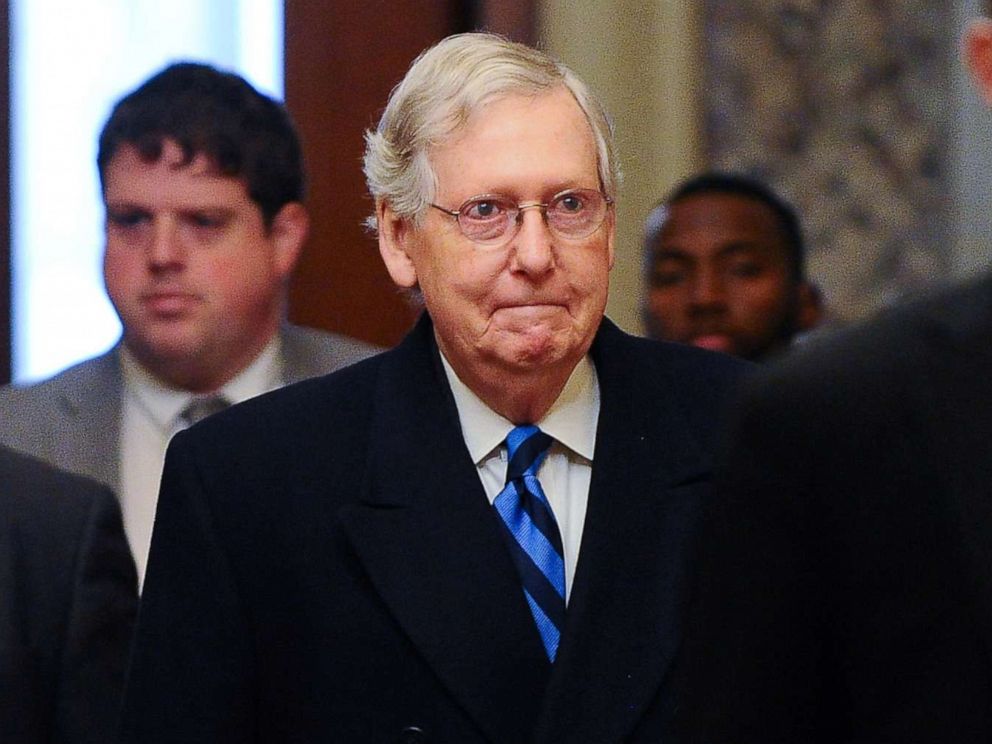
ABC News' Trish Turner caught up with McConnell as he arrived at the Capitol Thursday morning. Asked if he has the votes he needs to win the day Friday on witnesses, he responded, “We’ll see what tomorrow brings.” Then, when asked if he felt confident about the vote, he turned his head and with a sly grin and said, “I always do.”
The ABC News team of correspondents and reporters is covering every aspect of this story.
Here is how the day unfolded.
11:05 p.m. Alexander: 'Let the people decide'
Sen. Lamar Alexander, R-Tenn., has released a statement saying he does not plan to vote in favor of hearing additional witnesses, such as former national security adviser John Bolton.
"I worked with other senators to make sure that we have the right to ask for more documents and witnesses, but there is no need for more evidence to prove something that has already been proven and that does not meet the United States Constitution’s high bar for an impeachable offense," Alexander said.
"I believe that the Constitution provides that the people should make that decision in the presidential election that begins in Iowa on Monday," he added.
10:46 p.m. Senate adjourns -- but announcements coming in
The Senate adjourned and its questioning period is over. But news about how some will vote on witnesses Friday is trickling out.
Maine GOP Sen. Susan Collins, one of those swing votes, said soon after that she will vote for hearing from additional witnesses and subpoena new documents.
"I believe hearing from certain witnesses would give each side the opportunity to more fully and fairly make their case, resolve any ambiguities, and provide additional clarity," Collins said in a statement. "Therefore, I will vote in support of the motion to allow witnesses and documents to be subpoenaed."
Alaska Sen. Lisa Murkowski said she will not be making an announcement Thursday night.
"I am going to go reflect on what I have heard, re-read my notes and decide whether I need to hear more,” she said.
Sen. Lamar Alexander -- swarmed by reporters as he left the Capitol after a suspenseful night -- said he has informed McConnell of his vote on witnesses and will release a statement "within the hour."
10:15 p.m. No need for Bolton testimony?
A group of GOP senators, including Sens. Lisa Murkowski and Lamar Alexander, submitted to the president's legal team a question that seemed to imply there may be no need for John Bolton's testimony.
Though Murkowski and Alexander are designated as senators to watch in the approaching witness vote, fervent Trump supporters Lindsey Graham and Ted Cruz were also signed on to the question.
The question read: "Assuming for argument's sake that Bolton were to testify in the light most favorable to the allegations contained in the articles of impeachment, isn't it true that the allegations still would not rise to the level of an impeachable offense and that therefore for this and other reasons his testimony would add nothing to this case?"
Trump lawyer Pat Philbin responded first by clarifying that there was "no quid pro quo."
But then, he continued to say, "Even if that happened, even if he gave that testimony, the articles of impeachment still wouldn't rise to an impeachable offense." Philbin referenced Alan Dershowitz's presentation during opening arguments to support this claim.
In response to this question, Sen. Dick Durbin asked the House managers if they would respond. Rep. Adam Schiff was up to the challenge.
Schiff argued that there is no question as to what the president's motives were for withholding aid to Ukraine, and that Philbin's arguments would leave the founders "aghast."
"They wrote a beautiful Constitution; they understood a lot about human nature. They understood, as we do, that absolute power corrupts absolutely and they provided a constraint, but it will only be as good and as strong as the men and women of this institution's willingness to uphold it," Schiff said.
Then, Schiff transitioned to Bolton.
"It's not because we don't really know what happened here," Schiff said. "They just don't want the American people to hear it in all of its ugly graphic detail."
--ABC News' Allie Pecorin
9:06 p.m. Alexander to announce vote
Sen, Lamar Alexander, a key swing vote on calling witnesses, will announce his vote tonight, ABC News confirmed.
There is definitely a lot of suspense, as the senator, who is close to Mitch McConnell, has been spotted huddling with other key Sens. Lisa Murkowski and Susan Collins, and was seen passing a note to the GOP leader -- who didn’t seem pleased or terribly interested to get it.
8:28 p.m. Murkowski asks point blank: Why not call Bolton?
Sen. Lisa Murkowski, a GOP senator who could vote in favor of calling witnesses, has just explicitly asked the president's legal counsel why the senate should not call Bolton as a witness in this trial.
"You explain that Ambassador [Gordon] Sondland and Sen. [Ron] Johnson both said the president explicitly denied that he was looking for a quid pro quo with Ukraine," Murkowski's question read. "The reporting on Ambassador [John] Bolton's book suggests the president told Bolton both directly and indirectly that the aid would not be released until Ukraine announced the investigations the president desired. This dispute about material facts weighs in favor of calling additional witnesses with direct knowledge. Why should this body not call Ambassador Bolton?"
White House counsel Pat Philbin's response focused largely on the role that he argued the Senate ought to play in in an impeachment.
"I think the primary consideration here is understand that the House could have pursued Ambassador Bolton," Philbin said, arguing that the House chose not to subpoena Bolton.
He said if the Senate called Bolton where the House failed to, it could change the way impeachment plays out in the future, sending a message to the House that "you don't have to do all of that work before you get to this institution."
"That's not the way that this chamber should allow impeachments to be presented to it," Philbin said.
--ABC News' Allie Pecorin
6:34 p.m. Key GOP Sen. Lamar Alexander asks first question
If you're looking for any indication for which way Republican Sen. Lamar Alexander may be leaning, look no further than the question he just asked, teaming up with GOP Sens. Ted Cruz and Steve Daines -- asking how the impeachment proceedings against President Trump compare to previous bipartisan impeachments.
Alexander, who has yet to give us any indication of how he would vote on witnesses, pretty much just did. And he's a key vote.
It's his first question so far.
Alexander told reporters during the last recess that we won't know where he stands on witnesses until he hears all the questions and answers.
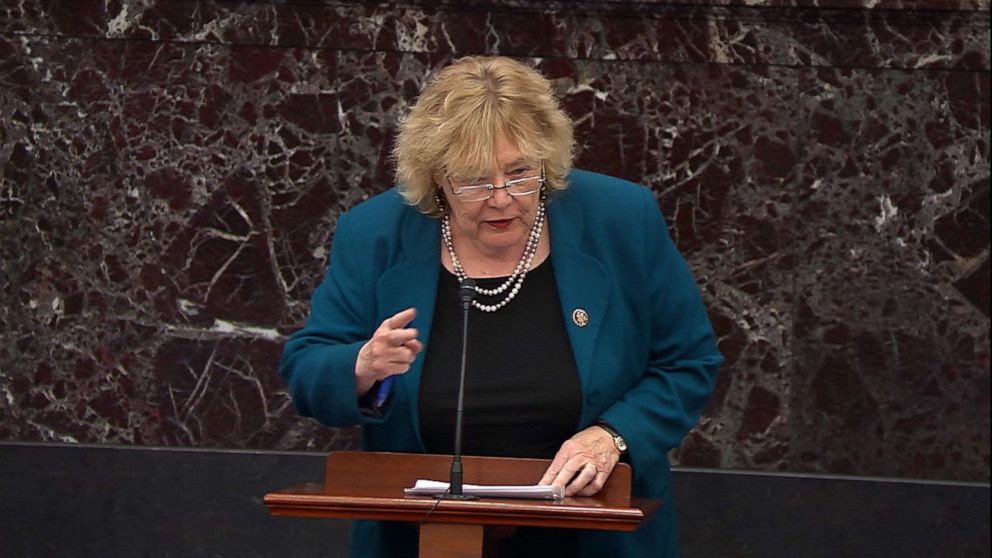
In response to the question House manager Zoe Lofgren said that even though the Judiciary Committee vote in the Nixon impeachment was bipartisan, "The parties were as dug-in as parties are today."
"They couldn't turn away from the evidence that their president had committed abuse of power, cheat in the election, and that they had to vote to impeach him," she said.
"When it came to the Clinton impeachment, that was again it started out along very partisan lines and it ended along partisan lines. And I believe the reason why, I said a short while earlier, was that we never had a high crime and misdemeanor that was the problem," Lofgren says.
"In the Trump case, and I'll say I've been disappointed because I serve with a number of Republicans in the House who I like, who I respect, who I work with on legislation, and I honestly believe that when this evidence came out, as within the Nixon Administration, we would have a coming together but it didn't happen much to my disappointment," Lofgren says.
--ABC News' Katherine Faulders
6:30 Inside the Senate chamber: Lots of note-passing
From ABC News' Allison Pecorin in the Senate chamber:
There is more note passing going on in the chamber than you might see in a middle school classroom. And some of the culprits are worth watching.
Most notably, around 5:45 p.m., McConnell tears a piece of paper from his notebook and passes a note onto the desk of Sen. Murkowski. She doesn't read it for about three minutes. When she finally opens it, she keeps a stoic face. Then she slides the note into her desk.
Some of the note passing was more light-hearted. Sen. Ben Sasse passed a note to Sen. Jodi Ernst who opened it, snickered and then turned around to give Sasse a thumbs up.
Members are also clearly starting to grow tired of not being allowed to speak or express themselves.
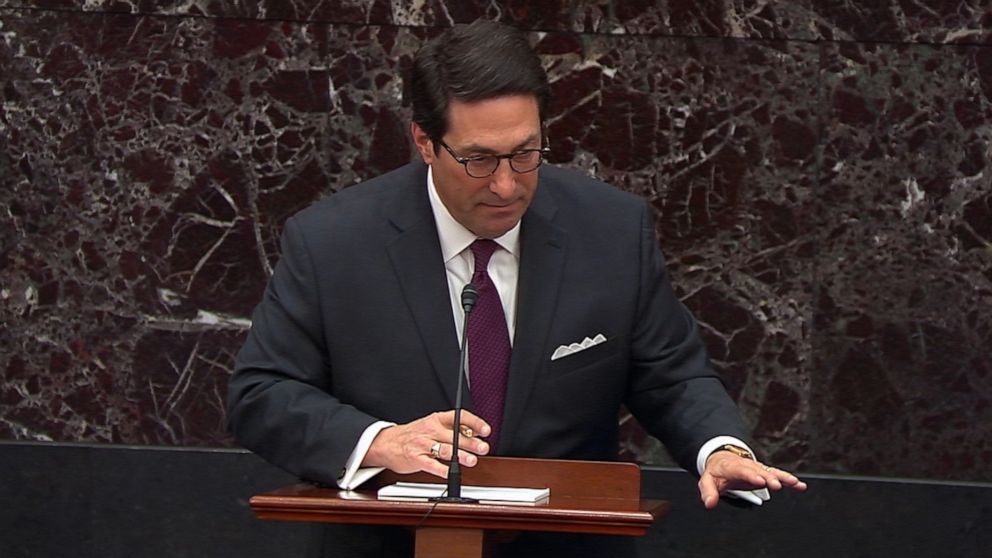
6:21 p.m. Sekulow: Democrats will never agree the trial is fair
GOP Sen. James Inhofe asks the president’s defense team: If additional witnesses are called, would you ever envision the House managers agreeing there has been a fair Senate trial if it ends in the president's acquittal?
The president's personal lawyer Jay Sekulow takes this question on, declaring “the answer’s no.”
“Now they will not agree that it's fair because what will happen is if there's a discussion of witnesses, and if we go to witnesses, Mr. Schumer's laid out the four he wants and he tells me I can have anybody we can have anybody we want,” Sekulow says.
“But the reality is that also includes documents. And that includes other witnesses that it may lead to. So at some point you'll say, because this cannot go on forever and we will be at the election, this body will say this has to come to an end. And they will say ‘aha, it's been brought to an end as we were about to get the key evidence.’”
--ABC News' John Parkinson
4:44 p.m. Schiff: Cap witness depositions to a week
Interestingly, Schiff at one point was essentially negotiating on the Senate floor -- appearing to address the prospect raised repeatedly by Trump's lawyers -- that bringing in witnesses could tie up the Senate for weeks or more and delay senators from addressing other important business.
He offered to cap depositions of potential witnesses to a week, similar to the Clinton depositions which happened over a three-day period.
"Let's cap the depositions to one week," Schiff said. "In the Clinton trial there was one week of depositions and you know what the Senate did during that week? They did the business of the Senate. The Senate went back to its ordinary legislative business while the deposition were being conducted. You want the Clinton model? Let’s use the Clinton model. Let's take a week let's take a week to have a fair trial. You can continue your business we can get the business of the country done is that too much to ask in the name of fairness -- that we follow the Clinton model that we take one week?
"I mean are we really driven by the timing of the State of the Union (set for Tuesday) should that be a guiding principle can't we take one week to hear from these witnesses? I think we can I think we should I think we must," he says
--ABC News' Katherine Faulders
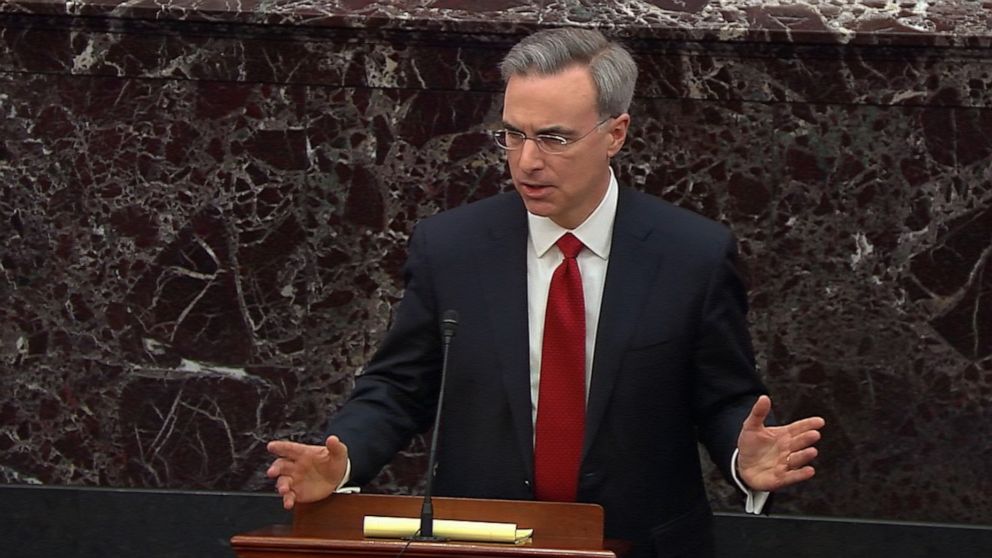
4:11 p.m. Bipartisan group of senators ask about Giuliani's role
In a the first question from a bipartisan group, Democratic Sens. Kyrsten Sinema and Joe Manchin and GOP Sens. Lisa Murkowski and Susan Collins ask about the legality of private citizens engaging in foreign policy.
The White House defense counsel Patrick Philbin argues Rudy Giuiliani was not engaging in foreign policy, but simply a conduit of information to President Trump.
"There would not be anything improper for a president in some circumstances to rely on a personal confidant to able to convey messages or receive messages back and forth from a foreign government that would are relate to the conduct of foreign affairs," Philbin says.
House manager Rep. Adam Schiff later calls it a "stunning admission." Schiff says.
"That's a personal, political errand," Schiff says. "They just undermined their entire argument," apparently referring to the contention that if Trump had "mixed motives" -- pursing policy while also pursuing political advantage -- that his conduct was not impeachable,
Schiff the pivots to the question of witnesses, saying all depositions could be conducted in just one week.
"Are we really driven by the timing of the State of the Union," Schiff says. "Can't we take one week to hear from these witnesses? I think we can. I think we should. I think we must."
2:41 p.m. Cipollone: 'Let's leave it to the people'
A group of Republican senators asks both sides to respond to the Democrats' argument that impeachment is so important because the president's misconduct is too serious to leave to voters at the ballot box.
The senators ask: How would acquitting the president prevent voters from making an informed decision?
White House counsel Pat Cipollone takes the ball for the president's defense team and argues the voters should make the ultimate choice if Trump remains president because the impeachment articles are partisan in nature.
"Let's leave it to the people of the United States. Let's trust them. They're asking you not to trust them. Maybe they don't trust them. Maybe they won't like the result. We should trust them. That's who should decide who the president of this country should be. It will be a few months from now and they should decide," he says.
In response, House manager Schiff says the president should be removed from office because it threatens the integrity of the election if he's willing to use foreign intervention to benefit his campaign.
"If it were the intent of the framers to say that a president can't be impeached in an election year, they would have said so. Now, they didn't for a reason. They were concerned about a president who might try to cheat in that very election," he says.
2:35 p.m. Schiff: 'You can'y make this stuff up!'
"...let me begin with something in the category of you can't make this stuff up," House manager Adam Schiff says. "Today while we've been debating whether a president can be impeached for essentially bogus claims of privilege for attempting to use the courts to cover up misconduct, the Justice Department in resisting House subpoenas is in court today and was asked, well, if the Congress can't come to the court to enforce the subpoenas was as you we know they're in here arguing Congress must go to court to enforce the subpoenas but they're in the court saying Congress thou shalt not do that, so the judge said if the Congress can't enforce its subpoenas in court, then what remedy is there? And the Justice Department lawyer's response is: impeachment! You can't make this up. I mean what more evidence do we need of the bad faith of this effort to cover up?"
ABC News' Alex Mallin reports a Justice Department official responds: “The point we made in court is simply that Congress has numerous political tools it can use in battles with the Executive Branch—appropriations, legislation, nominations, and potentially in some circumstances even impeachment. For example, it can hold up funding for the President’s preferred programs, pass legislation he opposes, or refuse to confirm his nominees.”
“But it is absurd for Chairman Schiff to portray our mere description of the Constitution as somehow endorsing his rushed impeachment process, or impeachments in anything remotely resembling the current context,” the official says.
2:32 Debate over legality of freezing aid
Democratic Sen. Mazie Hirono sends a question to the House managers about other examples of withholding foreign aid.
“In contrast to arguments by the president's counsel, acting White House Chief of Staff Mick Mulvaney stated that President Trump held up aid to Ukraine to get his politically motivated investigations. He claims, 'We do that all the time with foreign policy, Get over it.' What was different about President Trump's withholding of aid to Ukraine from prior aid freezes? Are you aware of any other presidents who have withheld foreign aid as a bribe to extract personal benefits?” Roberts read from her question card.
House manager Rep. Adam Schiff responds, saying that this differed from other holds on aid because there was no policy reason for the hold. He also cited the Government Accountability Office report that found the hold unlawful.
“Without legal authority he secretly placed a hold on the aid. Now, the president's counsel and representation give specific examples of past holds as if we cannot distinguish one for a corrupt reason and one that is for a policy reason,” Schiff says.
“No one has suggested you can't condition aid.” Schiff says. “But I would hope that they would all agree you can't condition aid for a corrupt purpose, to try to get a foreign power to cheat in your election.”
Republican senators ask: If there was a national security risk to holding the funds from Ukraine?
"The short straightforward answer is there was no jeopardy to the national security interests of the United States from the timing of the release of this money," White House deputy counsel Patrick Philbin responds.
Trump's defense lawyer then points to State Department officials who testified that the interruption of aid ultimately did not have significant impact on Ukraine's military capability.
"So no damage whatsoever to the national security of the United States," Philbin argues.
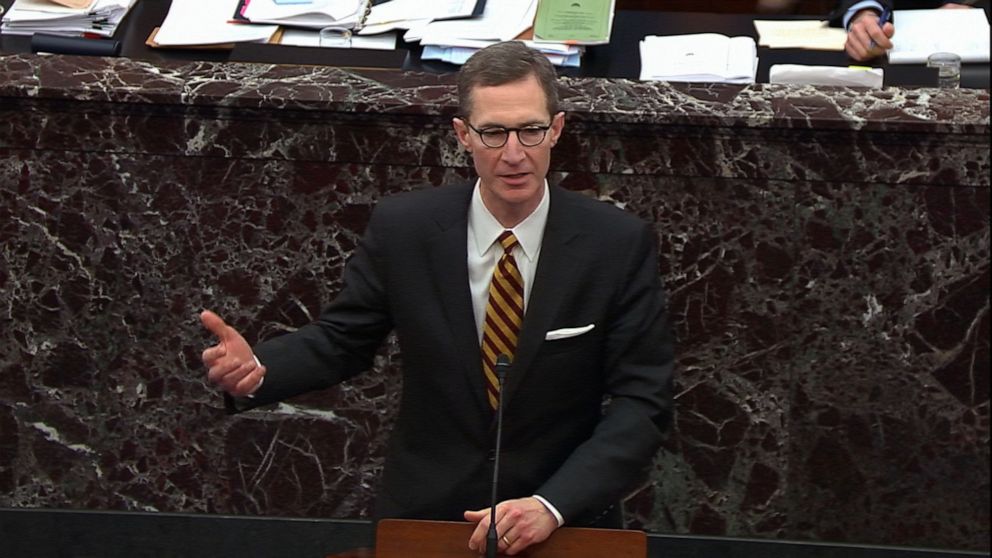
2:08 p.m. Trump team: Immigration policy used aid as pressure
In response to a question about past legal precedent, White House deputy counsel Patrick Philbin makes a connection between Trump withholding military assistance from Ukraine and the administration's negotiations with Central American countries last year.
The Trump administration ordered a stop on aide to Honduras, Guatemala and El Salvador in spring 2019. It later released the funds after government officials agreed to cooperate in the administration's crackdown on asylum requests at the southern border. The decision was roundly criticized by both immigrant advocates and former military commanders.
"That's part of what foreign policy is all about," Philbin says. "And that could arise in the situation of even investigations."
2:04 p.m. Sanders: 'Balls of fun' at Senate trial
ABC News' Campaign Reporter Cheyenne Haslett reports:
"You again?" Democratic Sen. Bernie Sanders booms when he spots reporters covering his campaign waiting for his arrival on Capitol Hill as he heads to the Senate trial.
Sanders is asked if he's having fun. "Balls of fun," he replies wryly.
Sanders explains his question from Wednesday (“Given the media has documented President Trump’s thousands of lies while in office — more than 16,200 as of Jan. 20 ... why should we be expected to believe that anything President Trump says has credibility?”)
"So look, the, the point that I was trying to make is that ... when you have a president who lies virtually every day -- and I'm not happy to say that but it's true, he is a pathological liar -- should you really regard as credible something that somebody says who lies all the time? That was the point of my question," Sanders says.
He also agrees with the idea that Chief Justice John Roberts should be the tie-breaker vote -- if it comes to that when the Senate decides Friday whether to allow witnesses, despite other Democrats' warning that could bring Roberts a lot of blowback.
"Sure," Sanders says. "It's incomprehensible to me that Republicans are not going to allow them to do that so I hope we can have some courageous Republicans today and if it comes to a tie vote I hope the Chief Justice votes in favor of witnesses."
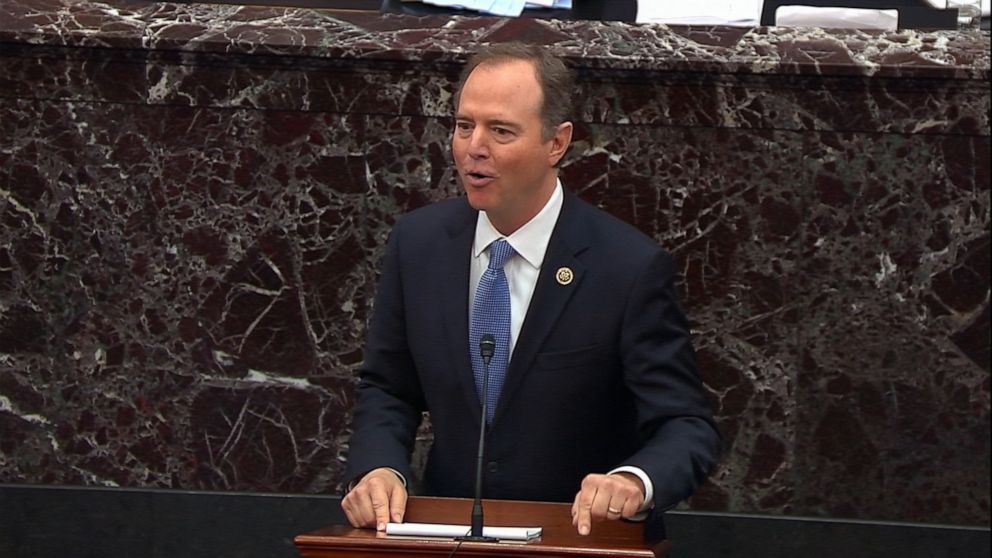
1:25 p.m. Schiff on Dershowitz: 'A descent into constitutional madness'
The House managers were asked to respond to arguments made Wednesday night by former Harvard Law School professor Alan Dershowitz -- that "If a president does something which he believes will help him get elected in the public interest, that cannot be the kind of quid pro quo that results in impeachment."
Schiff calls the argument "astonishing" and said it was evidence of "a descent into constitutional madness."
"The only reason you make that argument is because you know your client is guilty and dead to rights," Schiff says. "That is an argument made of desperation."
"The only reason you make that argument is because you know your client is guilty and dead to rights," Schiff says. "That is an argument made of desperation."
Dershowitz has pushed back on characterizations of that argument on Twitter, saying he did not say that a president seeking re-election can do whatever he wants but that a lawful act such as holding up aid money for policy reasons does not become unlawful because a president is seeking re-election.
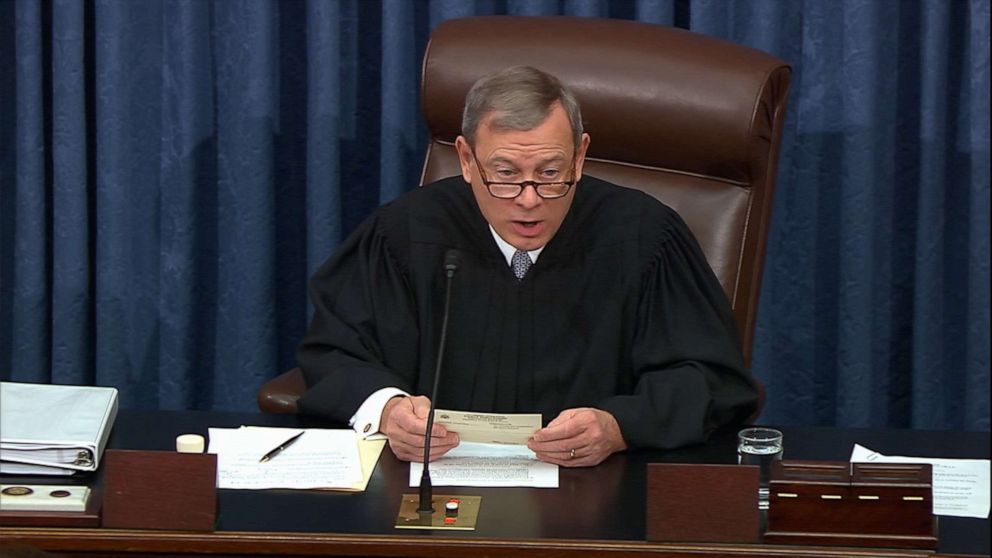
1:14 p.m. Roberts declines to read Paul's question, Paul walks out
"The presiding officer declines to read the question as submitted," Chief Justice Roberts says.
Paul then walks out of the Senate chamber.
McConnell kicked off today's proceedings with a not-so-subtle warning to senators about respecting the chief justice's role.
"We have been respectful of the chief justice's unique position in reading our questions," McConnell said. "I want to be able to continue to assure him that that level of consideration for him will continue."
--ABC News' Katherine Faulders and Allison Pecorin
After leaving the chamber, Paul holds a news conference, angrily telling reporters his question should have been read and answered.
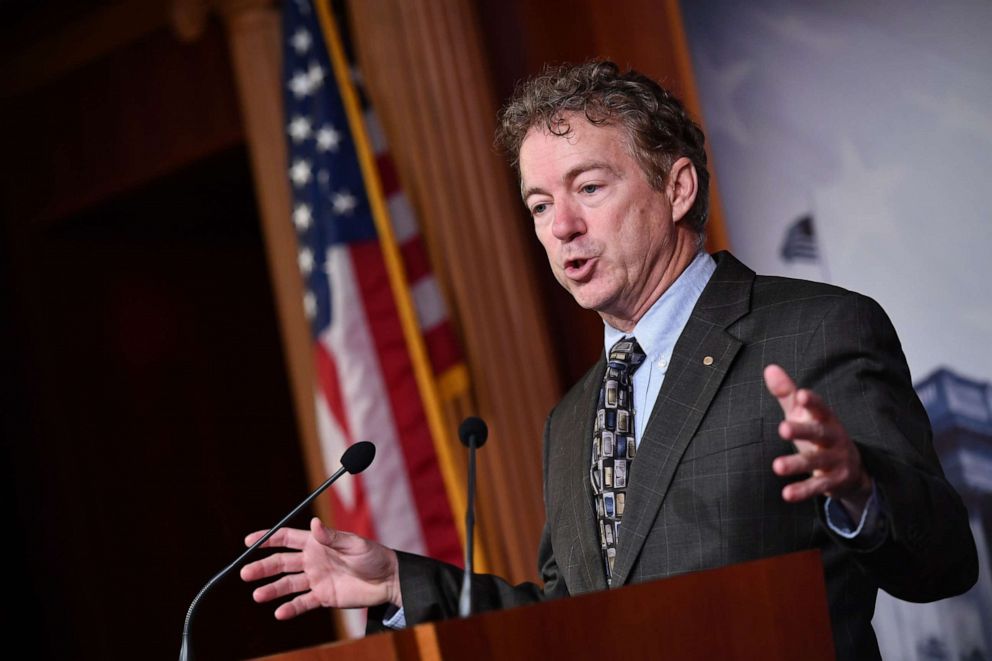
“I think this is an important question, one that deserves to be asked. It makes no reference to anybody who may or may not be a whistleblower. The Manager Schiff says he has no knowledge. If he has no knowledge, the rest of us can have no knowledge of who the whistleblower is. The president’s team says they have no knowledge of who the whistleblower is. I think it was an incorrect finding to not allow a question that makes no reference,” he says.
Asked why he didn’t ask for a Senate vote to overrule Roberts, Paul responds, “Right. That was a debate I made up until the very last minute, and I decided that we’re going to have enough voting tomorrow – and rather than delay the proceeding – I mean we’re going to have 12 hours of voting tomorrow probably – that I would let the proceeding go on. My point is that – you shouldn’t be able to use statutes to somehow make a whole part of the discussion of this impeachment go away."
1:01 p.m. GOP's Rand Paul to insist Roberts read his whistleblower question
As the Senate reconvenes, GOP Sen. Rand Paul says that he will insist that his question about the whistleblower be asked at the start of the trial.
Supreme Court Chief Justice John Roberts, who is presiding over the trial, reportedly blocked Paul on Wednesday from offering a question about the whistleblower.
Paul has previously named the whistleblower in tweets and had threatened to out him on the Senate floor a couple of months ago. He never followed through with that threat.
Several of his Republicans colleagues, including Republican Leader Mitch McConnell and Sen. Chuck Grassley, had previously warned him from doing so.
In a statement, Paul’s office said Thursday, ”While we are uncertain of how things will proceed, Senator Paul believes it is crucial the American people get the full story on what started the Democrats’ push to impeach President Donald Trump, as reports have indicated Obama appointees at the National Security Council may have discussed organizing an impeachment process in advance of the whistleblower complaint.“
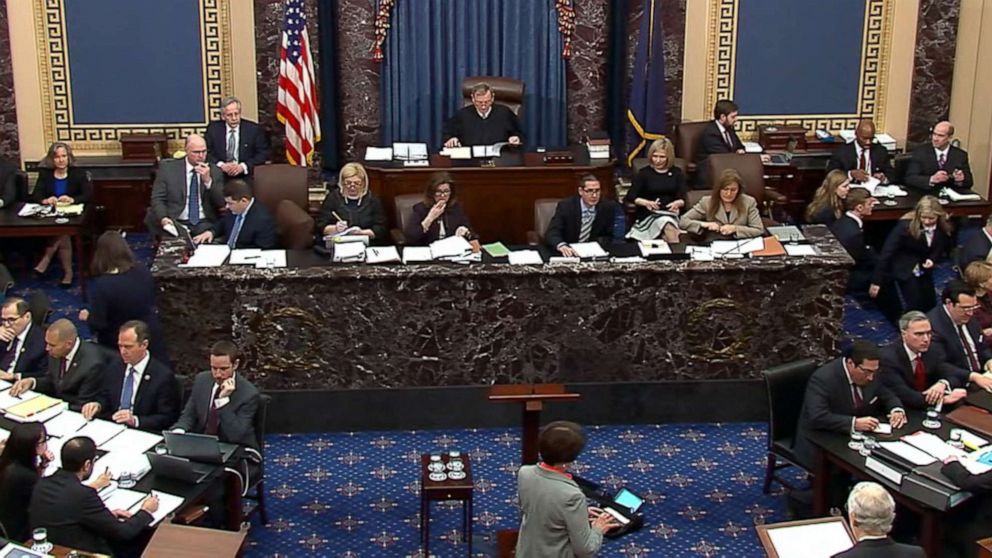
Democrats, however, are increasingly concerned about Paul’s efforts to out the whistleblower.
Sen. Richard Blumenthal told us just moments ago that if Paul - or any senator - attempts to name the whistleblower, they should be faced with serious sanctions.
“I think that kind of irresponsible and reprehensible action should be sanctioned by the Senate, if any of our members disclose the name of the whistleblower,” Blumenthal said.
Blumenthal said that Roberts has refused to offer any questions about the whistleblower from Paul thus far. Paul was heard complaining about it on the floor yesterday per our producers in the chamber.
“We protect whistleblowers,” lead House Manager Rep. Adam Schiff told us this afternoon.
“We need their cooperation we need their support in making the country work,” Schiff said.
He added: ”The only point in outing this whistleblower is to satisfy the desire of the president for retribution and that is not something that this Senate should allow.”
--ABC News' Mariam Khan
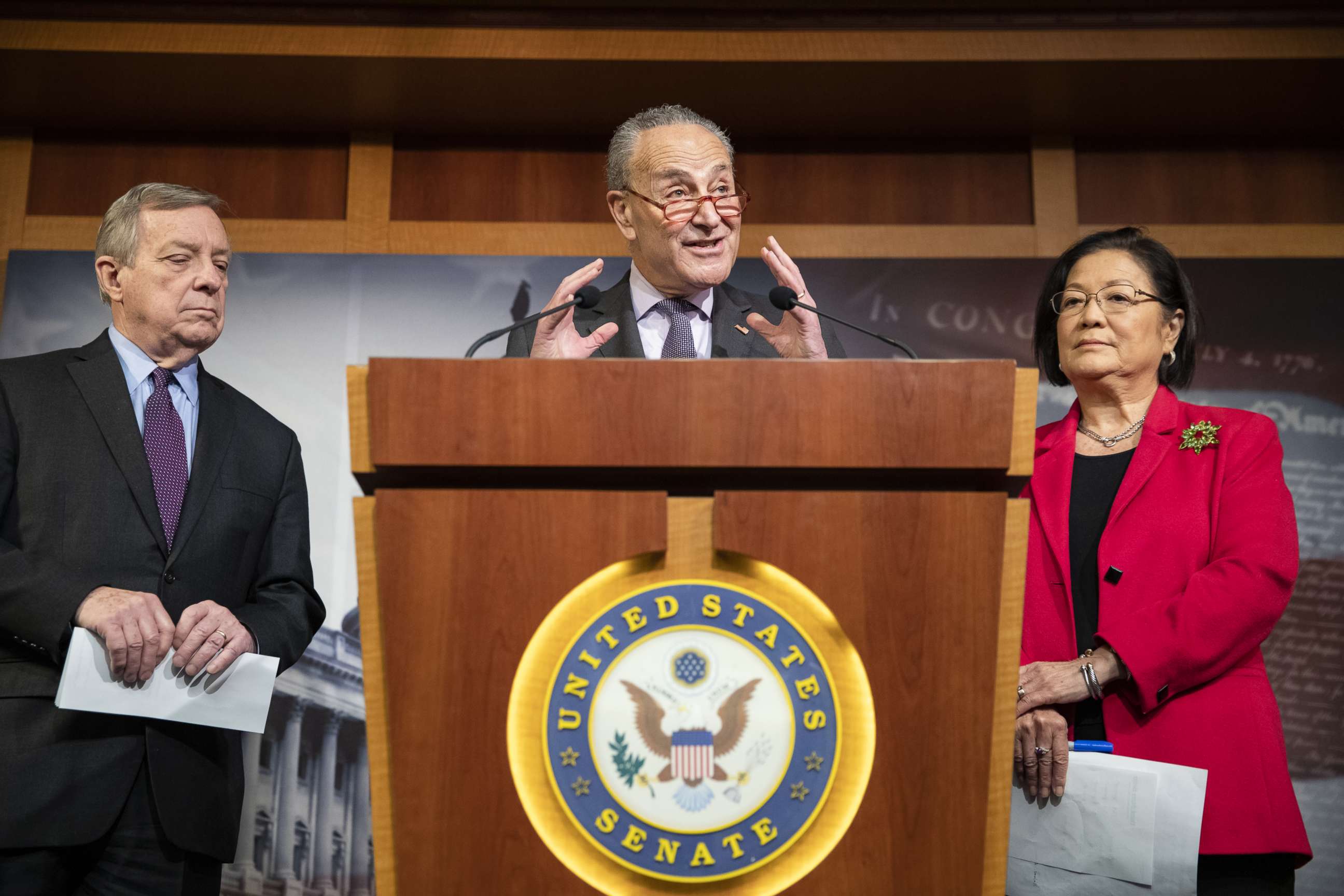
11:49 a.m. Schumer: Dershowitz argument 'would unleash a monster'
Senate Minority Leader Chuck Schumer, speaking before Thursday's trial session, begins by saying the first day of questioning “showed how flimsy, how specious and how dangerous the Republican arguments were.”
But he single out Republican Sens. Susan Collins and Lisa Murkowski for their strong and effective questioning.
“Some of the best questions actually came from Republicans,” Schumer said. “Senator Collins and Murkowski asked the president's counsel if they could give an example of the president expressing concern about Hunter and Joe Biden before the former vice president announced his candidacy. The president's counsel could not point to a single example to support the claim. So, he made up a bogus excuse that his answer was limited to what's in the record.”
Schumer also pointed out that the president’s counsel also could not answer Senator Mitt Romney’s question asking for the specific date when President Trump ordered the delay in military assistance and the reason he gave for doing it. These questions, he says, help make the Democrats’ case for witnesses and documents.
“You know who could help them answer those questions? Mick Mulvaney, John Bolton and our other two witnesses. So could the documents that we have asked to subpoena,” Schumer said.
Schumer also called out Alan Dershowitz for his argument that the president’s actions – even if aimed at increasing his chances of reelection – are not impeachable because the president believed his reelection is in the public interest.
“By Dershowitz's logic, President Nixon did nothing wrong in Watergate. He was just breaking into the DNC to help his reelection, which, of course, is in the public interest, according to Dershowitzian logic.”
“The Dershowitz argument, frankly, would unleash a monster. More aptly, it would unleash a monarch.”
--ABC News' Liz Alesse
In the late hours of debate on Wednesday, Trump's defense team offered two new controversial defenses. In one -- even if Trump intentionally withheld military aid from Ukraine in exchange for an investigation into Joe Biden, White House lawyers argued, those actions are not grounds for impeachment.
“Mere information is not something that would violate the campaign finance laws … it’s not campaign interference for credible information about wrongdoing to be brought to light, if it's credible information,” White House deputy counsel Patrick Philbin argued Wednesday night.
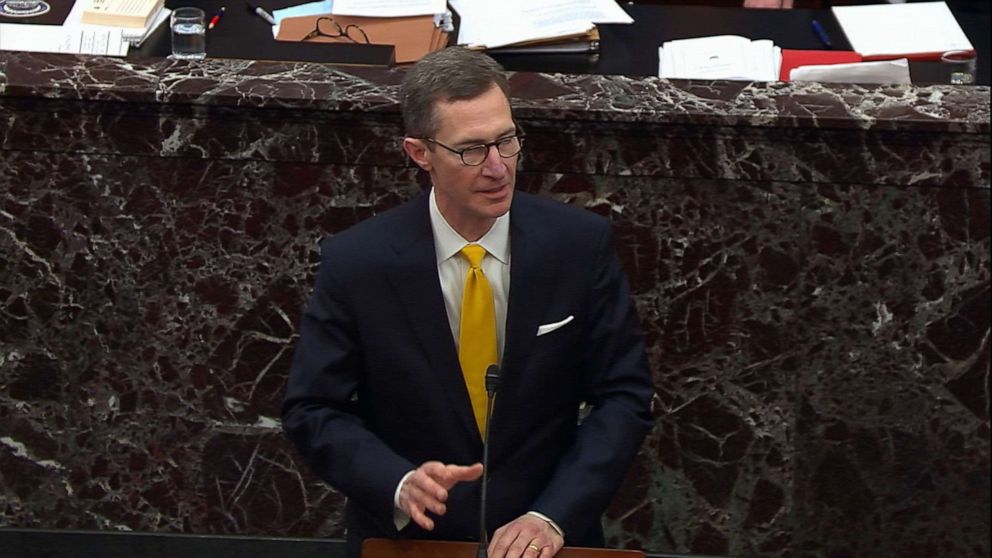
After the close of Wednesday’s session, Democrats forcefully rejected the idea that requesting foreign assistance is ever appropriate and legal.
“I think the most important thing was that the White House deputy counsel said that it's okay to take dirt on your opponent from a foreign government as long as it's credible. And you know what, that's not true. That's actually against the law,” Michigan Sen. Debbie Stabenow told reporters.
The argument from the White House counsel reinforces a controversial statement President Trump himself made in a June interview with ABC News.
"It's not an interference, they have information -- I think I'd take it," Trump told ABC News Chief Anchor George Stephanopolous. "If I thought there was something wrong, I'd go maybe to the FBI -- if I thought there was something wrong.
The response prompted a reaction from the Federal Election Commission at the time.
“It is illegal for any person to solicit, accept, or receive anything of value from a foreign national in connection with a U.S. election,” FEC Chair Ellen Weintraub said in a statement. “This is not a novel concept.”
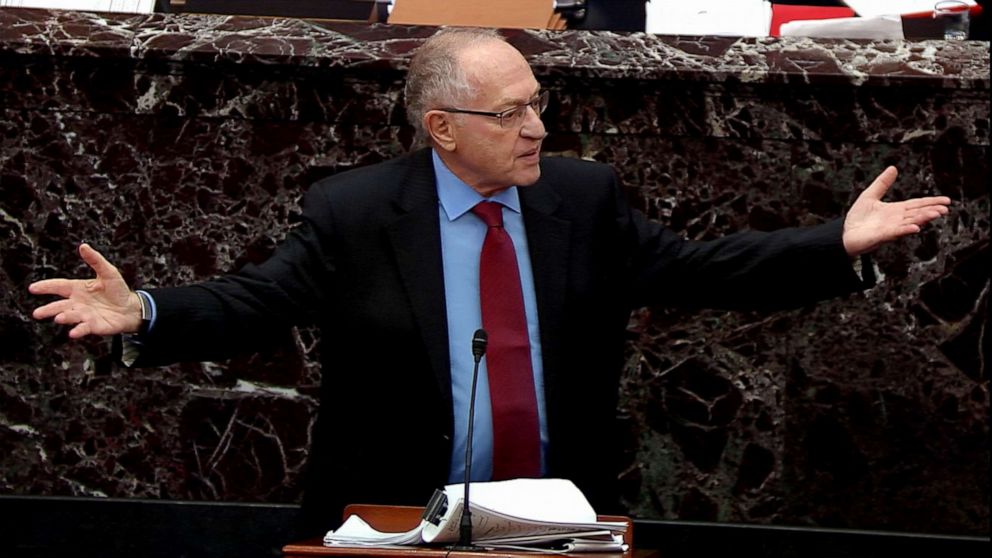
In addition to that argument, former Harvard Law School Professor Alan Dershowitz is drawing Democratic fire for arguing that President Trump could not be impeached because he was “acting in the national interest.”
"Every public official that I know believes that his election is of the public interest," he said.
"If a president does something which he believes will help him get elected in the public interest, that cannot be the kind of quid pro quo that results in impeachment," Dershowitz maintained.
Democrats voiced alarm about that expansive interpretation of executive power.
Ahead of the return to senators' questions Thursday, House impeachment manager Jason Crow called Dershowitz's argument "astounding."
"That is just a very dangerous hole to go down,” Crow told MSNBC.
Republican Sen. John Barasso declined to answer in an interview Thursday about whether he thought the argument was valid.
“I have heard enough. I am ready to make that vote and I know that the momentum in the Republican caucus is to do that as well,” told CNN.
ABC News Senior Congressional Correspondent Mary Bruce contributed to this report.




